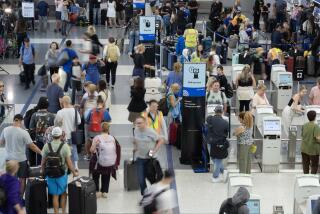Passengers must accept delays even when the fear ebbs
- Share via
Security at U.S. airports tightens sharply when there are threats of sabotage, such as the Unabomber scare at Los Angeles airports a year ago. It rachets up with the danger of reprisals, as it did last October when 10 men were convicted of plotting to blow up various New York City landmarks. Now the pressure is on again after the tragic explosion of TWA Flight 800, in which terrorism rides high on the list of potential causes.
At times like this, many Americans call for and readily accept the delays associated with tighter airport and airline security. Ultimately, many expect to pay more at the ticket counter and are ready to spend more time at pre-boarding check-in if that’s what it takes to keep airlines safe. But what happens when fears of terrorism fade, as they invariably do? Where then is the commitment of money and time by busy travelers? In those calm periods, airport security must remain the top priority, for, unhappily, there’s often something moving under the surface that could spell trouble.
Consider:
--Last May, for example, a guard at the federal Metropolitan Detention Center in Los Angeles was accused of wearing his uniform and flashing a badge to avoid detection at airport security checks, through which he allegedly funneled large quantities of heroin and cocaine.
--Last February, a motorist skirted a security gate at LAX, drove onto a taxiway and directly under a departing jetliner with 138 passengers aboard. Airport officials told a reporter that they were investigating the matter and might make procedural changes but insisted the incident did not expose any shortcomings in security.
--In November 1995 there were reports that sophisticated thieves had committed 1,707 baggage thefts at Los Angeles International during the year. A favored method was to barge into the metal detector line and simply grab a passenger’s carry-on bag after it had passed through the X-ray machine.
None of these instances involved a direct assault on airplane safety, but they exposed airport security failures. Senior U.S. counterterrorism officials say U.S. commercial carriers lag behind foreign airlines in security precautions. American carriers are vulnerable, and not all the tactics and technologies that would improve the odds against terrorist attacks have been implemented.
Why? Analysts point to public impatience once the motivation of fear has been lost; they say Americans would never agree to the strict and time-consuming steps of the Israeli national airline, for example. There is a continuing public sense that the U.S. commercial fleet is largely immune from attack.
If the analysts are correct, once the alarm of the explosion of Flight 800 has diminished, ticket prices and time delays will again become the predominant concerns of air travelers. When that happens, it will be important to remember that the LAX motorist could have been a suicide bomber, that the person flashing the badge might have been carrying an explosive or that the people who stole carry-on bags after the X-ray check might just as easily have slipped explosives or weapons into the luggage. Other nations were long ago forced to consider such possibilities. It’s time for the United States to do the same.
More to Read
Sign up for The Wild
We’ll help you find the best places to hike, bike and run, as well as the perfect silent spots for meditation and yoga.
You may occasionally receive promotional content from the Los Angeles Times.






